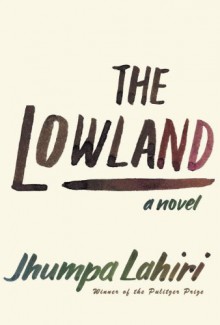
"It was as if Udayan were there, speaking to him, teasing him. He felt their loyalty to one another, their affection, stretched halfway across the world. Stretched perhaps to the breaking point by all that now stood between them, but at the same time refusing to break."
You don't have to be in a certain place, at a certain time to be able to catch the faint thrum of the lifeblood coursing through the pages of this book, live the heartbreak of its characters, to develop a sense of solidarity with their loss and desperation, to gaze at the spectacle of their unravelling fates across continents. But it will help if you have lived, at some point in time, in a city christened Calcutta by the British and rechristened Kolkata (the pure Bengali name) centuries later by a government intent on erasing telling signs of a nation's unfortunate colonial past. It will help if you have ever felt rudderless, adrift in a sea of anonymous human faces, unable to come to terms with a painful event, its aftermath too profound and terrible for you to grasp at once. It will help if you are carrying on with a half-life thousands of miles away from the land of your birth, toeing the line of divide between two distinct yet similar worlds.
I have lived near Tollygunge all my life - a sort of an overlapping region between the place where I spent the earliest years of my childhood and the place where I grew into a young woman. Every time I arrive at the beginning of Tollygunge Circular Road from another portion of the city, I know with a comforting certainty that I am close to home, close to the assurance of rest and a meal, close to where my loved ones await my return as yet another day reaches its inevitable end. And Ms Lahiri has brought my humble, modest, familiar Tollygunge to life. Reminded me that my decrepit and majestic city has been witness to the rise and decline of too many political regimes, to the bloodletting during senseless communal riots and a terrible famine manufactured by a colonial administration too busy fighting a world war. That my city has been living for centuries before I was born, like a mythical, gargantuan beast and that it would continue to throb with life and activity years after I am gone. How silly is it that in the eagerness to match steps with the developed world, to achieve set targets, we forget the blood-soaked, tear-streaked history of the country we live in, that we are inextricably bound to the political upheavals which serve as foundation stones to our present state of equanimity, to the sheer tragedy and violence of turbulent times.
Neither am I Jhumpa Lahiri's biggest fan nor her harshest critic. My reaction to her writing has been very subdued so far. In addition, Ms Lahiri never seems to accomplish anything else other than rehashing the same old themes of nostalgia, the very cliched search for identity and the familiar rigmarole in novels recounting the immigrant experience. But with The Lowland, she has achieved something monumental, managed to rekindle an extinguished flame within me. Perhaps her achievement lies in an accurate enactment of that unmistakable sensation of being anchored to a place and a way of life, of being pulled towards a powerful centre. Whatever the case maybe, my past resentment about her 'undeserved' Pulitzer win is now gone as if it never was.
It's like she has reached out to me from across the shores of the Pacific, held my hand and gently propelled me towards a life-like portrait of Calcutta, my Kolkata, the maddening, mystifying, glorious and ugly city of my birth which will remain as beloved to me by any other name, towards the people who inhabit its upscale townships and dingy shanties, towards the unknown stories of hardship and triumph which breathe life into this jungle of steel, brick and mortar, towards the struggles of an ill-fated generation now forgotten in the mad dash for globalization, towards a culture which has molded me into what I am today. It felt like looking into a mirror after a prolonged gap and spotting something hitherto undetected in that reflection. It felt like remembering something important.
I won't go into the subject of Udayan's misguided idealism and the havoc it wreaked in the lives of his loved ones. I won't elaborate on how Subhash ended up living a proxy life, responsibly stepping up to assume all the roles designated for his brother. I will not retrace Gauri's path to self-discovery and emancipation from the assigned identities of bereaved widow, dutiful daughter-in-law, mere wife and mother. And I certainly will not defend or condemn her refusal to let her life be defined by the flawed choices of the man she loved.
Instead I would only leave you with a polite request to place your faith in the Booker committee's judgement and read this. Regardless of where you may have grown up - Rhode Island or Tollygunge - irrespective of whichever movement has left its indelible mark on the socio-political landscape of your nation -SDS or Naxalite agitation - Ms Lahiri will take you on a trip down memory lane, back to your roots, to the values that reside at your core and hold you together, to the people you have left behind somewhere in this long, befuddling journey of life but cannot ever forget. And she may remind you of who you used to be once and what you are now.

 Log in with Facebook
Log in with Facebook 





